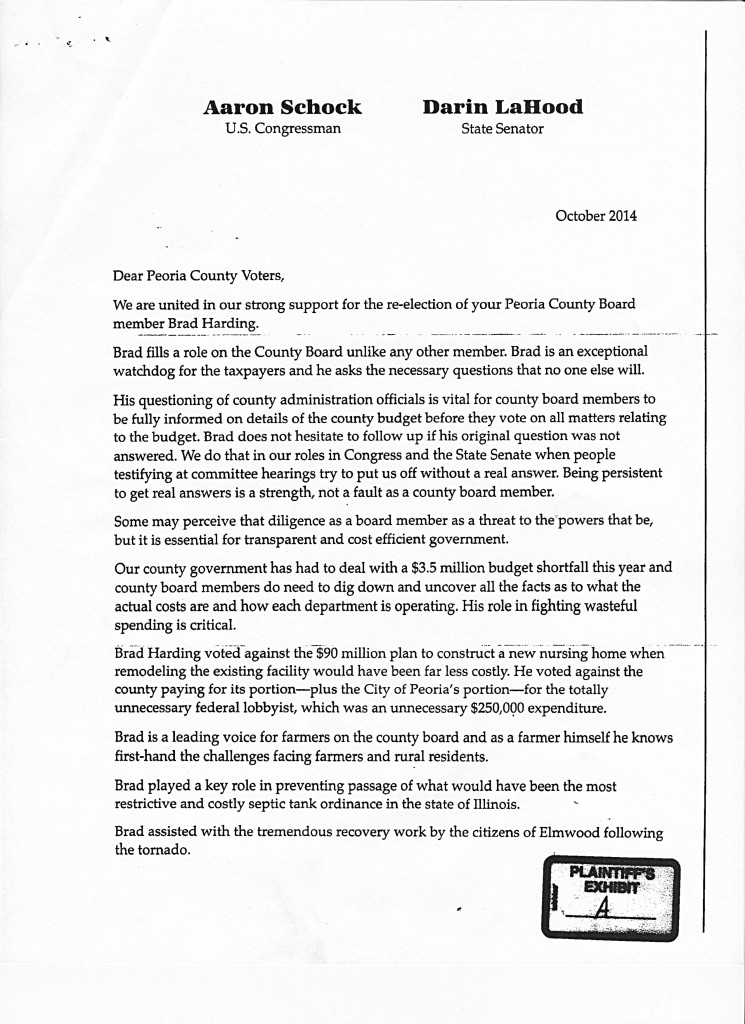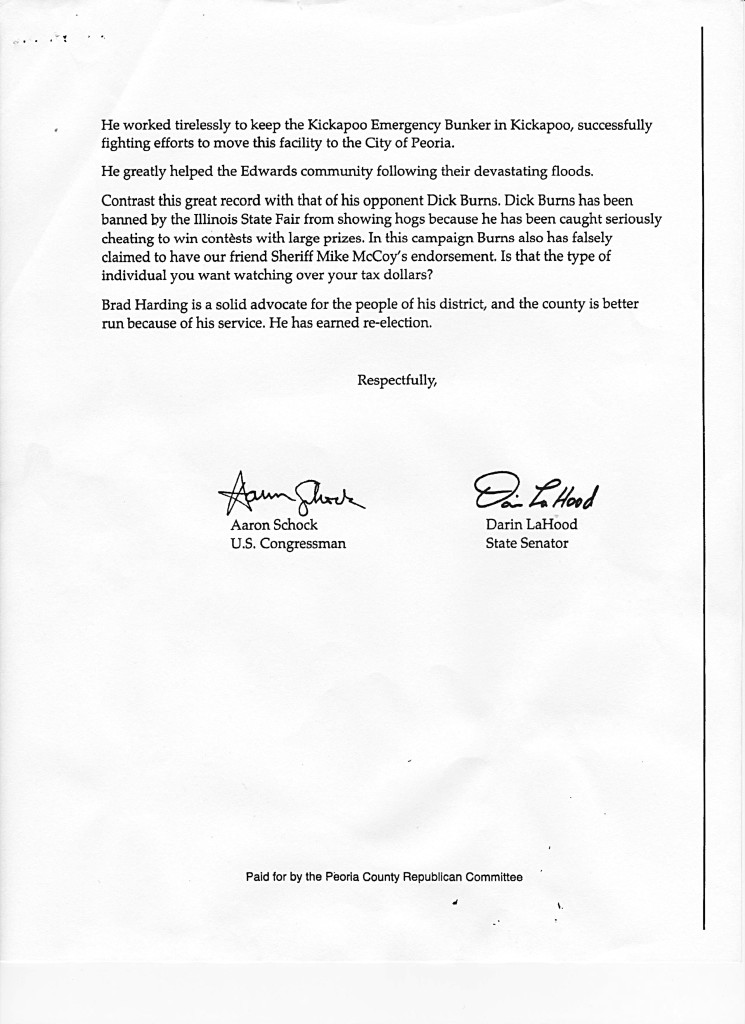Justice delayed can be justice denied, and words matter
As the Illinois State Fair wound down on Aug. 18, a libel suit linked to the fair and Central Illinois’ current and former Congressmen was about as active as a beer tent after closing.
Courtroom 213 on the northwest corner of the Peoria County Courthouse was silent and dark at 10 a.m. Aug. 18, the scheduled time for an appearance by parties in “Richard Burns v. Aaron Schock, Darin LaHood and the Peoria County Republican Central Committee.” The double doors were locked, signaling another delay in a nine-month-old saga that’s seen one defendant difficult to find and others failing to comply with a judge’s order to answer the complaint.
Many people remain unaware of the suit, filed last October and alleging that former U.S. Rep. Aaron Schock and his successor Darin LaHood signed a letter sent to area households that defamed Burns’ reputation and business by accusing him of improprieties. The suit includes the Peoria County Republican Central Committee (PCRCC) because it apparently paid to print the letter, which was sent the week before the November 2014 election in support of County Board incumbent Brad Harding, but attacking business activities by Burns, a 68-year-old Edwards Democrat running against him:
“Dick Burns has been banned by the Illinois State Fair from showing hogs because he has been caught seriously cheating to win contests with large prizes,” said the two-page letter Schock and LaHood signed.
Since then, Burns “has been questioned by neighbors about being banned from the Illinois State Fair for cheating, and has been confronted by persons at the Illinois State Fair and questioned as to whether he has the right to sit as a judge when he had been ‘kicked out of the State Fair’,” the suit says.
Although the Republicans’ letter was “an overt attempt to manipulate the election,” the suit charges, it went beyond candidates’ political or ideological differences, according to an area legal scholar.
“Let’s assume the accusation regarding banning, hogs and cheating is false and recognize that it appears to hit Burns in the wallet as well as his feelings,” said Deckle McLean, a former Boston Globe writer and retired journalism educator who’s published dozens of articles on media law, especially defamation and privacy.
“In the context of the Peoria County Board race, Burns, as a candidate, looks like a public figure,” McLean continued. “Rules governing defamation lawsuits would call upon him to demonstrate the accusation was actually malicious – actual malice being a legal standard meaning a high degree of fault including reckless disregard for the truth. Burns’ suit might have some traction if the accusation amounts to reckless disregard — and it looks like it might be that bad.”
Burns’ Peoria attorney, Christopher Ryan, in the suit said the statements make “factual allegations which are false in their entirety. [They] cannot be characterized as opinions, hyperbole, or loose or figurative language, cannot reasonably be subjected to an innocent construction [and] they imply not only the potential of criminal conduct but also impropriety in Mr. Burns’ professional integrity in agriculture as well as in his professional reputation as a judge for cattle shows.”
Burns is a breeder and shower of Angus cattle who “does not now, nor has he ever, shown hogs at the Illinois State Fair,” according to the lawsuit. Further, the complaint says, Burns – who for years has judged shows in Kansas, Wisconsin and other states – is not banned for anything and never cheated at the Illinois State Fair, much less for “large prizes,” which aren’t even given out at the fair.
The suit says Schock and LaHood acted “either with malice knowing they [the statements] were false, or in reckless disregard of whether they were false or not.”
Schock, 35, resigned last year after questions arose about spending irregularities. LaHood, 48, is a former U.S. Attorney and Illinois State Senator elected last September to replace Schock
Libel is a false statement published about someone and harming that person or his or her reputation, by tending to bring the target into ridicule, hatred, scorn or contempt of others. The statement must identify the person and be presented as fact and not clearly identified as an opinion. Statements can be negligent through not taking the time to verify assertions or made with the intent to harm someone’s reputation. A key defense is provable truth.
Ryan and Burns say the lawsuit isn’t political. Burns, whose wife is Colleen Callahan (defeated by Schock in 2008), declined to comment except to say, “It affected my profession.”
The issue scheduled to be heard Aug. 18 was a motion by LaHood and the PCRCC, presented by Chicago attorney John Fogarty, to dismiss one of two counts, claiming that it failed to properly plead and specify specific damages sought. The hearing was vacated by the attorneys, and Ryan that day told The Community Word he expected to file an amended complaint addressing Fogarty’s argument the next week.
Meanwhile, Ryan filed a separate motion seeking judgment or sanctions for defendants’ failure to abide by a May 13 order from Judge Jodi Hoos to answer the complaint by June 3, an order subsequently extended to June 24 – with no response, Ryan said.
“It has now been over nine months since the complaint was filed and roughly eight months since defendants Darin LaHood and the PCRCC were served,” Ryan wrote. “It is time that the parties are joined in the pleadings so discovery can be conducted and this case can be properly litigated. The failure … constitutes a violation of the Court’s order, and their repeated promises to file an answer by certain deadline have been disregarded.”
Eventually, Schock was located and also served with notice of the suit, and his answer via his Peoria attorney, Greg Hunziker, was received June 27, when he either denied the allegations or said he didn’t have sufficient information to admit or deny claims. If Hoos rules that the suit can proceed, attorneys could then exchange information in the discovery process and take sworn depositions from all parties.
Elsewhere, a federal grand jury in Peoria in July ended its 15-month inquiry into Schock’s actions in office without returning an indictment, but another federal grand jury in Springfield could still deliberate over the matter.
“Once a dispute gets into court, anything can happen,” McLean said about the libel suit, “– something the defendants as well as the plaintiff might keep in mind.”
Court records show a Case Management Conference is scheduled before Hoos at 10:30 a.m. on Sept. 9, but it’s anyone’s guess whether it will take place.
Maybe minutes mean months to some people.
But certainly, words matter.
Letter at heart of libel lawsuit



2 comments for “”